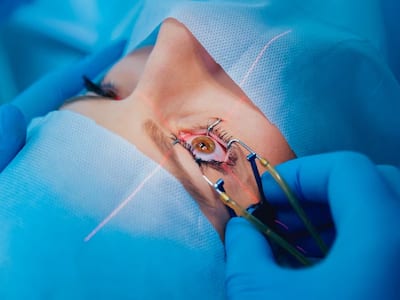
Before considering a laser vision correction procedure, it is very important to understand the refractive error affecting one’s vision.
Seeing the world with clarity is a precious experience. However, a significant number of individuals are affected with refractive errors such as nearsightedness, farsightedness, or astigmatism affecting their visual capabilities. These may have the potential to adversely impact one’s personal and professional live. Fortunately, the field of laser vision correction has made progress leaps & bounds, and includes procedures like Advanced Surface Ablation, LASIK (Laser in-situ Keratomileusis) and ReLex (Refractive Lenticule Extraction) – including state-of-the-art advanced treatment such as SMILE (Small Incision Lenticule Extraction), and lens-based procedures. These procedures present an opportunity to restore the brilliance of clear vision. But how can one identify the most appropriate laser vision correction procedure?
Understanding the Refractive Error Affecting One’s Vision
Before considering a laser vision correction procedure, it is very important to understand the refractive error affecting one’s vision. Visiting an ophthalmologist for a thorough eye examination is the right first step. It is important to note that the overall health of eyes plays a crucial role in the success of laser vision correction. Conditions like dry eyes, glaucoma, cataract, and certain retinal diseases may affect one’s candidacy for the procedure. A thorough eye examination helps identify any existing issues that might impact the outcome of the surgery.
Understanding Visual Needs and Goals
Identifying specific visual needs and goals is the foundational step towards choosing the right vision correction procedure. Vision issues such as nearsightedness (myopia), farsightedness (hyperopia), astigmatism and their extent may vary from individual to individual. Therefore, each of these conditions may require a different approach for correction. Having realistic expectations is vital when considering any medical procedure, including laser vision correction. While the goal is to reduce dependence on glasses or contact lenses, perfect vision cannot always be guaranteed. Many individuals achieve significantly improved vision, but some might still require low prescription glasses for specific tasks, such as reading in dim light. Discussing expectations and goals with the ophthalmologist helps to ensure a clear understanding of the potential outcomes.
Minimally Invasive Corrective Procedures with Fast Recovery
Modern minimally invasive vision correction procedures offer enhanced comfort and precision, coupled with rapid recovery. These procedures utilize advanced technology, like laser-guided systems, ensuring precise corrections tailored to individual prescriptions and minimizing discomfort during and after the surgery. For example, conventional Laser Vision Correction surgeries, like LASIK necessitated the creation of ‘Flap’, 20-21 mm in circumference, in the cornea, followed by using another type of laser (Excimer Laser), that reshapes the cornea. However, a minimally invasive procedure using SMILE (Small Incision Lenticule Extraction) employs a femtosecond laser to create a small, precise incision within the cornea. This minimizes disruption to the corneal biomechanics and nerves, potentially resulting in less dry eyes and discomfort post-surgery. The precision of this type of procedure, combined with a smaller incision, leads to faster recovery, often allowing patients to experience improved vision within a shorter period post- surgery. With minimized risk, this procedure provides an efficient solution for improved vision and enhanced quality of life.
Correcting Multiple Vision Issues with a Single Procedure
Refractive surgery, a remarkable modern advancement in ophthalmology, has the potential of correcting multiple vision issues. This innovative approach addresses conditions like nearsightedness (myopia)and astigmatism simultaneously. The space of refractive surgery has been rapidly evolving with technology-led advancements leading to multiple treatment options being available today. Pioneering refractive eye surgery using SMILE addresses multiple vision issues through a single minimally invasive procedure. This advanced technique, often employed for myopia (nearsightedness) and astigmatism, corrects vision by removing a thin layer of the cornea, called a lenticule, through a small opening. In the near future, Refractive surgeons would also have the ability to treat far-sightedness (Hypermetropia), with lenticule based procedures.
SMILE’s benefits include rapid recovery, minimal discomfort, and potentially reduced dry eye symptoms. The single-step approach corrects multiple vision problems simultaneously, making it an attractive option for those with multiple refractive issues. However, it must be noted that assessing candidacy by a qualified ophthalmologist is crucial to determine the suitability of SMILE for individual cases.
Lifestyle Factors
When contemplating the various options for vision correction, it is essential to acknowledge that certain procedures necessitate temporary modifications to one’s lifestyle during the recuperation phase. The adaptability of one’s lifestyle to the specific procedure’s recovery requirements should be carefully evaluated as it may have a direct impact on the outcome of the procedure. One’s lifestyle and profession can also play an important role in identifying and deciding the most suitable laser vision correction procedure. For instance, individuals involved in sports or demanding professions requiring extremely precise vision may prioritize such laser vision correction procedures.
READ RELATED: Can Your Diet Act As A Natural Sunscreen?
Consultation with an Eye Care Professional
Like any other healthcare procedure, seeking counsel from an experienced eye care professional is the most pivotal step in the vision correction journey. Through a meticulous eye examination coupled with an insightful consultation, the pattern of one’s ocular health and visual needs is unveiled. The guidance of a qualified eye care specialist extends beyond the mere assessment of refractive errors. It encompasses a holistic evaluation of ocular health nuances, considering factors that go beyond the surface to ensure a comprehensive understanding of one’s vision landscape and deciding the most effective laser vision correction procedure.
Laser vision correction procedures have transformed the lives of millions by providing them with clearer and more comfortable vision. However, determining if it’s the right option requires careful consideration of factors such as one’s refractive error, age, eye health, lifestyle, and expectations. By thoroughly evaluating these aspects and consulting with an eye care expert one can make an informed decision that aligns with their visual needs and goals, paving the way for a brighter, clearer vision post-surgery.
The article is contributed by Prof. Dr. Mahipal Sachdev, Chairman and Managing Director and a Promoter of Centre For Sight.
Total Wellness is now just a click away.
Follow us on
Don’t Miss Out on the Latest Updates.
Subscribe to Our Newsletter Today!
window.addEventListener(‘load’, (event) => {
$(‘#commentbtn’).on(“click”,function(){
(function(d, s, id) { var js, fjs = d.getElementsByTagName(s)[0]; if (d.getElementById(id)) return; js = d.createElement(s); js.id = id; js.src = “//connect.facebook.net/en_US/sdk.js#xfbml=1&version=v2.3”; fjs.parentNode.insertBefore(js, fjs);}(document, ‘script’, ‘facebook-jssdk’));
$(“.cmntbox”).toggle();
});
});









